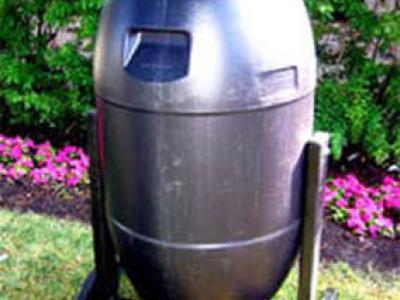Compost is one of nature's best mulches and soil amendments, and you can use it instead of commercial fertilizers. Using compost improves soil structure, texture, and aeration and increases the soil's water-holding capacity. Compost loosens clay soils and helps sandy soils retain water. Adding compost improves soil fertility and stimulates healthy root development in plants. The organic matter in compost provides food for microorganisms, which keeps the soil in a healthy, balanced condition. This allows nutrients to be produced naturally by the feeding of the microorganisms, so few if any soil amendments will need to be added.
Composting Basics
The three main ingredients that a composter needs are heat, oxygen, and moisture. The best position to place your composter is in full sun or at a minimum partial sun. The black barrel will absorb heat all day and hold heat during the night, and will not cool down as much as an open bin or stacking bin, maintaining the composting process.
Use a 50-50 mix of Kitchen (Green) and Yard (Brown) material in your composter.
Do not use soil, starter, accelerator, fertilizer or any other material other than yard and kitchen scraps.
You can start adding kitchen scraps as soon as you have your composter is set-up. When you toss in your first amount of kitchen (Green) scraps, see what is in the composter and add the same amount of yard (Brown) material.
When the compost is finished it will have the consistency of heavy loamy soil. Dump the compost material into a wagon, cart, wheelbarrow or on the ground and work it into your garden soil, flower beds or other places you use compost. Then start another batch.
For additional information, refer to the instruction sheet provided with your composter.
Take a look at the following links for more information about composting:
Mulches
For mulches or wood chips, you can often find affordable large quantities from local municipal services. For wood chips, it's recommended to purchase ones that are seasoned and free of weed seeds. Some local municipal composting facilities include:
It's possible to get woodchips from local arborists working in your area as well. ChipDrop is an organization that makes this connection easier.
